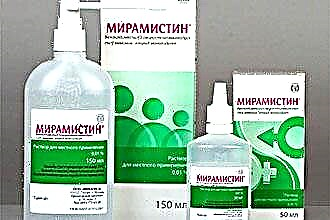Angina is an inflammatory process in the tissue of the tonsils, due to many reasons. It can develop as an independent disease or be a complication, a symptom of other pathologies.
During pregnancy, the body of women is most vulnerable to diseases of an infectious, inflammatory origin, so you need to be careful about your health. This applies to both prevention and the correct therapeutic approach. Treatment of tonsillitis during pregnancy is a difficult task, which includes early diagnosis, the preparation of an effective treatment complex that avoids the appearance of undesirable consequences.
 The woman's immune system, like the endocrine, cardiovascular, respiratory, undergoes some changes that are caused by the conception and bearing of the fetus. The conditions created by the body ensure the normal growth and development of the unborn child, in a sense, limiting the needs of the woman.
The woman's immune system, like the endocrine, cardiovascular, respiratory, undergoes some changes that are caused by the conception and bearing of the fetus. The conditions created by the body ensure the normal growth and development of the unborn child, in a sense, limiting the needs of the woman.
Among the first, the immune defense suffers, and therefore sore throats during pregnancy are quite common. In addition, a pregnant woman has to suffer from exacerbations of chronic diseases, for example, pyelonephritis, varicose veins, hemorrhoids.
Angina as an independent disease
In this section, we will analyze the features of the course of the pathology, consider how to treat angina during pregnancy. Diagnostics, preparation of a treatment program (choice of drugs, dose, duration of admission) is carried out exclusively by a specialist, taking into account the severity of the disease, the course of pregnancy, the presence of concomitant pathology.
The development of primary tonsillitis is caused by streptococcal infection, which is characterized by short-term hyperthermia, signs of general intoxication, inflammation in the palatine tonsils, closely located lymph nodes. Angina carries the threat of generalization of infection, the occurrence of an autoimmune disease.
Without pathogenetic treatment, the risk of kidney damage in the form of glomerulonephritis, connective tissue, and the development of rheumatism increases.
In almost 90% of cases, hemolytic streptococcus is detected by laboratory methods, however, tonsillitis associated with staphylococcus, corynebacteria, hemophilic bacillus is not excluded. The source of infection can be carriers of the pathogenic pathogen or sick people.
In most cases, infection occurs by airborne droplets during close long-term communication in a stuffy room. In this case, microorganisms enter the body through the respiratory system. Also, microbes, in particular staphylococci, can enter together with food (dairy products, minced meat).
 Angina in pregnant women especially often develops against the background of the influence of negative factors, for example, low temperatures, stress, toxicosis. Reproduction of pathogens occurs in the palatine, lingual tonsils, the back of the pharynx. Further spread is observed in regional lymph nodes, provoking an inflammatory reaction.
Angina in pregnant women especially often develops against the background of the influence of negative factors, for example, low temperatures, stress, toxicosis. Reproduction of pathogens occurs in the palatine, lingual tonsils, the back of the pharynx. Further spread is observed in regional lymph nodes, provoking an inflammatory reaction.
The progression of infection leads to the formation of paratonsillar abscesses, and the penetration of microbes into the bloodstream contributes to a septic state, damage to distant organs (heart, joints, kidneys).
The development of autoimmune processes is due to a disorder in the immune system, as a result of which antibodies are produced against its own tissues. Depending on the clinical picture, the degree of damage to the tonsils, several forms of tonsillitis are distinguished:
- Catarrhal, edematous, infiltration of the tonsils. Without treatment, the course of the disease progresses with the appearance of purulent masses.
- Follicular - characterized by the appearance of pus inside the follicles, visible through the edematous tissues in the form of grains. When they are opened, a film forms on the tonsils.
- Lacunar - manifested by the accumulation of purulent discharge in the lacunae. The pathological process penetrates into deep tissues, a superficial plaque appears.
- Ulcerative necrotic - leads to the appearance of ulcerative defects, gray, dull plaque, which indicates tissue death. The process quickly spreads to the surrounding tissue.
Symptomatically, tonsillitis can be suspected based on the first signs:
- headache;
- joint aches;
- severe malaise;
- sore throat;
- fever up to 37.5 degrees.
If untreated, catarrhal angina develops more severe forms (lacunar, follicular), which cause pathological changes not only in the pregnant woman, but also in the fetus.
 The progression of the disease is evidenced by febrile hyperthermia, sleep disturbance, intense sore throat, decreased appetite. At the same time, lymph nodes are felt in the form of enlarged, painful formations. Looking through the throat, you can see follicles, purulent plaque, enlarged tonsils.
The progression of the disease is evidenced by febrile hyperthermia, sleep disturbance, intense sore throat, decreased appetite. At the same time, lymph nodes are felt in the form of enlarged, painful formations. Looking through the throat, you can see follicles, purulent plaque, enlarged tonsils.
In the necrotic form, gray films are observed, which, when trying to remove them, leave an open wound surface with an uneven bottom. In the case of the formation of an abscess, it is difficult to open the mouth, there is increased salivation. Symptomatically, this period is manifested by fever up to 40 degrees, fainting.
The fight against hyperthermia in pregnant women should be started at 37.5 degrees, avoiding seizures, impaired consciousness, fetal hypoxia, and spontaneous abortion.
Infectious-toxic shock is characterized by lethargy, decreased daily urine output, and pallor of the skin. The appearance of hemorrhages, angina pectoris, shortness of breath, blood in the urine indicates a violation of vascular permeability, damage to capillaries, myocardium, kidneys.
Specific sore throats
In diphtheria, the primary symptoms are similar to angina. The localized form is characterized by the defeat of the tonsils without the surrounding tissues, and in the case of a widespread process, there is a lesion of the soft palate, the posterior pharyngeal wall. With a toxic course, swelling of the neck appears, swallowing and breathing becomes difficult. Plaque from the tonsils is difficult to remove, leaving a bleeding surface. Films do not dissolve in water.
A long course of antibiotic therapy provokes the development of fungal sore throat, which is characterized by low fever, loose "cheesy" plaque. After removing the foam, a smooth lacquered surface is exposed.
Secondary tonsillitis
Inflammation in the tonsils is formed in diseases of an infectious, non-infectious nature. Changes in the tonsil area are observed in ARVI, syphilis, tularemia, scarlet fever, measles, blood pathology, mononucleosis.
General directions in treatment
 Consider how to treat a sore throat in pregnant women - how and how to cure it at home. When a woman suspects that angina develops during pregnancy, treatment implies adherence to the recommendations on the daily regimen, nutrition, and also taking medications.
Consider how to treat a sore throat in pregnant women - how and how to cure it at home. When a woman suspects that angina develops during pregnancy, treatment implies adherence to the recommendations on the daily regimen, nutrition, and also taking medications.
Throughout the entire period of treatment, a woman needs:
- Observe bed rest, which allows you to recuperate.
- Plentiful warm drink, due to which the elimination of toxic waste products of the pathogen from the body is accelerated, thereby reducing intoxication. Fruit drinks (cranberry), compotes are suitable for a woman. Kissel from berries envelops the walls of the affected tonsils, which makes it possible to activate regenerative processes. Adequate drinking replenishes fluid losses against a background of high fever, shortness of breath.
- Diet food with the exception of hot spices, solid foods.The most useful is a dairy-vegetable diet rich in vitamins.
Drug therapy
A pregnant woman should understand that even a catarrhal form requires a full range of therapeutic measures. This allows you to prevent the spread of infection, to avoid taking antibacterial agents.
Antibiotic therapy during pregnancy can prevent rheumatism, myocardial and kidney damage. The choice of antibiotics is made by the doctor.
The attending physician, after conducting pharyngoscopy, analyzing symptoms, evaluating the results of laboratory diagnostics, establishes the stage of the disease. Given the pregnancy, the doctor determines how to treat angina, selects special antibacterial agents that do not harm the fetus.
Approved antibiotics for pregnant women with angina:
- Ceftriaxone, Cefepim, Cefalexin belong to the group of cephalosporins;
- Amoxiclav (a number of protected penicillins);

- Sumamed (macrolide group).
The appointment of antibacterial drugs is advisable for follicular, lacunar angina. For a quick recovery, gargle with antiseptic solutions, for example, Miramistin, Rotokan, Chlorophyllipt, Furacilin, is performed.
It is necessary to carefully approach the choice of herbal medicines, because some of them can affect the hormonal background, the tone of the uterus. The consequence of the uncontrolled use of folk remedies can be a spontaneous abortion, premature birth.
To reduce hyperthermia, drugs with paracetamol are suitable.
Prohibitions in the treatment of angina during pregnancy
It is forbidden to cure complicated angina on your own. A doctor's consultation is necessary when the first signs of the disease appear. If a woman decides to do therapy at home, she should know what is not allowed in the treatment.
- Compresses on the neck area are strictly prohibited due to the risk of an increase in the inflammatory process in the tonsils, the spread of infection.
- Removal of the film from the surface of the tonsils leads to the formation of an open wound, infection of the surrounding tissues. The risk of sepsis also increases with the penetration of pathogens into the general bloodstream, the addition of a secondary infection.
- Hot foot baths, compresses, warming up, as well as any procedures related to heat are contraindicated.
- A temporary effect can be provided by Lugol's solution, but a complete cure is not observed.
Preventive directions
 Treatment of angina in pregnant women is a difficult task that requires the right approach and timely diagnosis. The main requirement is the appointment of drug therapy that allows you to cope with pathogenic microorganisms without causing side effects on the fetus.
Treatment of angina in pregnant women is a difficult task that requires the right approach and timely diagnosis. The main requirement is the appointment of drug therapy that allows you to cope with pathogenic microorganisms without causing side effects on the fetus.
If simple recommendations are followed, a woman can significantly reduce the risk of diseases or even prevent their development. So, it is recommended for a pregnant woman:
- Take multivitamin complexes at the planning stage of pregnancy and for 9 months.
- Avoid large gatherings of people during periods of epidemics.
- Go to the pool, physical, breathing exercises.
- Ventilate the room regularly, carry out wet cleaning.
- Dress warmly, avoid drafts.
- Reduce the impact of stress.
- Avoid contact with sick people.
- During the planning period of pregnancy, the rehabilitation of chronic foci of infection, the treatment of inflammatory diseases, which can worsen against the background of a decrease in immunity, are carried out.
- Observe the cooking technology, thereby preventing the penetration of pathogens with food.
- A good rest, sleep.
Despite the severity of the entire period of pregnancy, toxicosis, internal discomfort, pregnancy is still a wonderful period. He prepares a woman for the birth of a child, which requires colossal physical and emotional strength. In order not to complicate the course of pregnancy, to ensure the good health of the unborn child, you need to be careful about your health.




